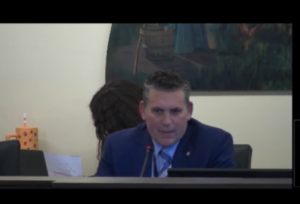
A bill capping storage fees passes Oklahoma House committee
By onAnnouncements
An Oklahoma House Committee approved a bill Tuesday that will cap storage fees and restrict administrative charges for total loss vehicles.
The bill, SB641, passed the Senate last month with a 32-8 vote after the original bill was gutted and amended on the House floor to include the storage language.
Oklahoma Sen. Lonnie Paxton (R-23), an Oklahoma Farm Bureau insurance agent, introduced the bill Feb. 3. Original language in the bill, passed by the Senate Business and Insurance Committee, allowed insurance companies to provide incentives to consumers for the use of certain repair shops.
This language was removed from the original bill and replaced with storage cap language similar to SB784 while on the Senate floor. The bill was never picked up for discussion in the Business and Insurance Committee.
During a discussion in the Commerce and Economic Development Oversight Committee Tuesday, Rep. Mark Tedford (R-69), a sponsor of the bill, introduced an amendment by saying all sides of the argument have agreed on it.
“This has been an ongoing negotiation on both sides. I feel like there is an agreement on this language,” Tedford said.
Rep. Chris Sneed (R-14) noted he has heard a lot of concern about the bill and asked who had agreed.
Tedford responded that negotiations included body shops, the Oklahoma Farm Bureau, and other insurance providers.
“I’m unfamiliar with the body shops. Do they have an association?” Sneed asked.
Tedford replied, “I believe it is their association that we are dealing with.”
Brian Shellem, Oklahoma Auto Body Association (OKABA) legislative committee chair, said Wednesday that OKABA has provided language for the bill that was ultimately not used. He added that OKABA does not support the bill.
He said OKABA suggested the cap for electric vehicle storage be increased to $2,000 because it could take up to 50 parking spots to store damaged EV vehicles.
Damaged EVs involved in a collision should be stored 50 feet from other vehicles and structures because of fire risks, according to the National Highway Traffic Safety Administration.
Isolation bays, which include concrete walls and drainage systems, are recommended for storing damaged EVs.
“Any way you slice this, I am not happy,” Shellem said about the bill. “It is not a good bill.”
Shellem said he supports a free market and is not for price controls.
The bill limits administrative charges related to total loss vehicles to four hours. It also sets the maximum daily storage rate an auto body repair shop can charge for a total loss vehicle.
For the first 10 calendar days, the cap is set at $39 for all motor vehicles of any size, including marine vessels, and $78 for vehicles with a lithium-ion battery that sustained damage to the battery pack or has exhibited fire, smoke, or popping or hissing sounds.
On the 11th calendar day, the maximum daily storage rate may increase to $75 for all vehicles and to $156 for lithium-ion battery vehicles.
An amendment was passed in Tuesday’s committee to increase the storage for lithium-ion battery vehicles to $200 on the 11th day.
The maximums do not apply to vehicles that necessitate indoor storage and are approved by insurance companies at an agreed-upon rate in advance.
Every repair shop will be required to provide written invoices and respond to requests for invoices concerning the pickup, release, or delivery of a motor vehicle on its premises to the insurance company within eight business hours.
The act would become effective Nov. 1 if passed.
Images
Rep. Mark Tedford (R-69) speaks to the Oklahoma House Commerce and Economic Development Oversight Committee April 15/screenshot
